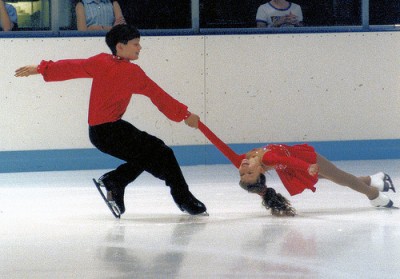I have a guest poster today who was always an excellent competitor – my brother, Will Chitwood, from Chitwood Skating!

Having competed in pairs skating for ten years, I learned various techniques to handle the pressures of competition and public performance. Now I’m a skating coach. Here’s how I deal with my students’ most common competition fears.
Usually the most common fear for new skating competitors is performing in front of an audience. The skaters fear they will make a mistake and embarrass themselves in front of their family and friends. The most common question new competitors ask me is, “What if I fall?”
- For these new competitors I first explain how everyone, even Olympic champions, fall sometimes in competition. I tell them it’s not a big deal to make a mistake.
- I let them know if they try their hardest I will be proud of them no matter what.
- Then I tell them to keep going if they do fall or make a mistake because I want them to forget about it and focus on the next element in the routine. This strategy works well if something goes wrong because it focuses the skater’s mind on the next part of his or her routine and not on the past mistake.
- The initial fear of performing in competition gets better the more a skater performs in front of a crowd. But it also helps for skaters to realize that even the top skaters feel nervous before a competition.
- I like to have my skaters visualize themselves skating a clean program a few times before they compete to get their mind in a good state.
- Then I talk to them about other subjects besides skating while they warm up off ice. This helps them relax and not worry as much about the upcoming event.
- Shortly before they take the ice, I will have my skaters close their eyes and take slow, deep breaths in and out numerous times to calm their nerves and heart rate.
- I also like to give my skaters three easy focuses for the event such as smile, strong extensions, and good landing positions. I have them make these goals their primary focus for the program. That way, if they achieve them, they will be proud of themselves even if it’s not their best skate.
These tips have worked in both my skating and my students’ skating. I hope they help you as well! 🙂